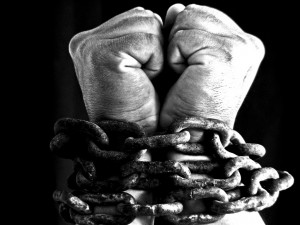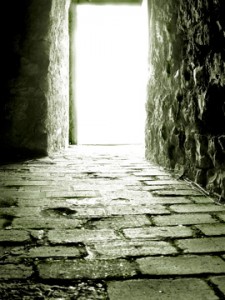
If a brother is requested to do something difficult or impossible he should, at first, accept the command meekly and obediently.
Can we change?
Obedience.
Again.
Again I’m forced to ask the ever penetrating questions: how to respond to authority? and how to exercise authority? These two issues have oscillated throughout the Rule of St. Benedict and has raised obedience as the vow which cuts through the individualised, libertarian ethic of our age. Obedience is the virtue, the practice, I think, that challenges us most because it seems to our ‘progressive’ minds a reversal into authoritarian state which birthed both fascism and communism.
We want freedom. We want to be released from what others think of us. We want to be able to censor the oppressive demands placed upon us.
My heart knows what is good for me.
We want to be autonomous, in control, because the alternative is perceived to be unsatisfying and, at worse, abusive. We want freedom to choose because choice is the goal of our culture. We are told,
We can do anything if believe strong enough. We can achieve whatever we put our mind to. If anyone tells you can’t do it, they are wrong.
Our televisions project stories of people, ‘achieving their goals’. The contestants speak out in un-ironic parody the same statements of self belief. They’re ‘expressing themselves’ and ‘no one will stop them.’ It all sounds so positive and encouraging but under the surface lies a slightly more sinister tone of captivity.
Underneath the statements of ‘knowing self’, of finding ‘true self’ is an oppressive narrative which holds people in an identity which is unable to change;
You are who you are.
In this reality we need to discover who we are as static personalities and express it. Our gender and sexuality, our personality strengths and flaws all set in stone by a Creator who likes diversity no matter what the impact on others. Mistakes can be blamed on genetics and change of behaviours subtly denied because if we can change then we don’t know what we want or need and therefore choice becomes trickier to make.
In this consumerist narrative of free choice, we hear the call to obedience to something outside of our own choice as foreign. The truth is obedience opens our eyes to see the potential conversion of our life. It is only in obedience that we can be transformed from an old life to a new life but we must trust that which can lead us through the painful sear of true freedom into the fullness of life. All other freedom than that discovered through a commitment to obedience is false, a mirage that will blind you.
True liberation is a mystery many do not fully find because the false liberation is more appealing. The temptation makes more sense to us because we ask
why would freedom be difficult; it is the absence of pain, is it not?
True liberty does violence to self and, like Christ, who disregarded that he was sovereign becomes a slave to serve others. (Oscar Romero, The Violence of Love (Pennsylvania: The Plough Publishing, 1988) p.40)
It is this liberation and conversion that St. Benedict calls monks to through the consecrated life. Ultimately, this life is ‘impossible’ without the faithfulness and stable love of God. It would be wrong to enter the monastic life thinking that it is achievable, it is within our capabilities. Many decide not to pursue the monastic life because they see it as impossible with their personality or who they are. The truth is: it’s not about you!
It doesn’t matter who you are, or even think you are because that, hopefully, will change; in fact, it must change if you are to live the life of discipleship and true repentance. It matters not if, when you think about the expectations the Rule places upon you, you cannot imagine yourself being able to ‘succeed’ at being a monk. It only matters if you trust that God can and will transform you from the life you live as you enter into a being ready for eternal life with him.
The superior, the authority of the abbot, is not forceful here. Again we see the gentleness needed in instructing a monk into the possibility of change. There is room, for St. Benedict, to go together, abbot and monk, as brothers into the presence of their all loving Father to seek his will. Both are equal under God and it is his will that they both must obey. Norvene Vest reflects beautifully on this approach to authority,
I resonate with the image suggested by the Latin word translated “gentleness.” The word is mansuetudine, meaning “accustomed to the hand,” and refers to training wild animals. I have a vivid sense of a small colt, standing shivering in cold and excitement as an attentive trainer approaches and gently caresses it. I often feel that way in the presence of God: fearful and shivering both with anxiety and eagerness, but willing myself to do all I can to respond, which is often simply not to run away. Instead, I tremble, and await the hand that touches me in love. (Norvene Vest, Preferring Christ: a devotional commentary on the Rule of St. Benedict (Pennsylvania: Morehouse Publishing, 2004) p.261)
Reflection
We as the Church must not be lured into the social narrative of consumerism and individualism. We must proclaim the truth and reality of conversion. This is not some political ‘change’ that is preached during election season. This is deep and painful change that leads to meaningful relationships of trust and hope.
The church must suffer for speaking the truth, for pointing out sin, for uprooting sin. No one wants to have a sore spot touched, and therefore a society with so many sores twitches when someone has the courage to touch it and say: “You have to treat that. You have to get rid of that. Believe in Christ. Be converted. (Oscar Romero, The Violence of Love (Pennsylvania: The Plough Publishing, 1988) p.27-28)
Our message of salvation loses all it’s potency if we collude with the morally liberal philosophies of this world or the dictatorial conservative world views which state that significant change of behaviour is not needed nor is it possible. We are all sick and distorted. We are plagued by faulty genes and personalities. We’ve all been infected and we all need healing! To heal the patient must be obedient to the process of change otherwise nothing will happen.
The church must become a place of real transformation and healing to all who come. Change must be on our banners and explicit in all we do but a change that rightly is rooted in humility (acknowledgement of the sickness) and obedience (the willingness to let go of the past and step into a new life.)
Loving Father, we submit. We submit to your gentle hand in obedience. We cannot see how we will live out the impossible but we trust that nothing is impossible for you. What we have always been can be redeemed for you, for the Kingdom, the glory and the power are yours, now and forever.
Come, Lord Jesus

 Where he came from, neither of them knew. How he got past their captors; who could say? He was either a fraud, one of the warders provoking them for his own amusement; or their captors had fled leaving the cell unguarded; or it was a miracle. None of this mattered much as he walked over to them and spoke.
Where he came from, neither of them knew. How he got past their captors; who could say? He was either a fraud, one of the warders provoking them for his own amusement; or their captors had fled leaving the cell unguarded; or it was a miracle. None of this mattered much as he walked over to them and spoke. Through the doors they saw their guards sleeping soundly. It seemed so strange – no – illogical that they could slumber during a rescue mission in the jail they were meant to watch. The whole incident was feeling so mysterious and implausible; a dream with no reason. Yet this man kept leading them down the corridor towards a bright light; the final exit to freedom.
Through the doors they saw their guards sleeping soundly. It seemed so strange – no – illogical that they could slumber during a rescue mission in the jail they were meant to watch. The whole incident was feeling so mysterious and implausible; a dream with no reason. Yet this man kept leading them down the corridor towards a bright light; the final exit to freedom.